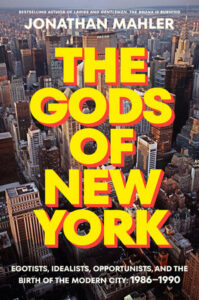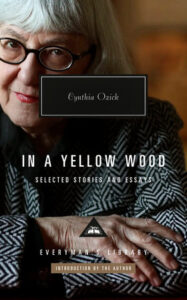
Our bounty of brilliant reviews this week includes Garth Risk Hallberg on Jonathan Mahler’s The Gods of New York, Mychal Denzel Smith on Jamaica Kincaid’s Putting Myself Together, Judith Warner on Jessa Crispin’s What is Wrong With Men, Hannah Gold on Cynthia Ozick’s In a Yellow Wood, and Hamilton Cain on Peter Orner’s The Gossip Columnist’s Daughter.

“Mahler’s storytelling is most powerful precisely where it digs the deepest. His writing on homelessness is particularly strong, revealing the housing crisis not as an insuperable fact of city life but as the outcome of deliberate choices: the failure to fund a planned system of transitional ‘community-based mental health centers,’ the scandalous clearing of the city’s S.R.O. hotels to make way for high-end developers. Portraits of the homeless advocate Joyce Brown and the fifth grader David Bright, one of the city’s numerous ‘hotel kids,’ glow with nuance and sympathy.
By and large, though, in keeping with the era’s tabloid tenor, Mahler’s protagonists are the titular ‘gods’: a pantheon of boldface names, mostly white, mostly male, who keep popping up at the center of every story … Whatever its merits as history, the great-man approach succeeds admirably as cultural criticism. That is, it recovers the centrality of the now-diminished tabloids in shaping the city’s hierarchies of attention.
…
“Social media has since usurped this agenda-setting power. But where a newsfeed is fragmentary and private, sealing us inside algorithmically curated silos, the tabloids were demotic and public, a live-action chyron covering the face of every second stranger on the bus or subway with a legible record of the city’s dreamwork. They had the virtue of naming aloud the obsessions this famously outspoken city elsewhere prefers to euphemize: race and sex and death and money.
Then again, as Joan Didion pointed out 34 years ago in Sentimental Journeys—still the best thing written on 1980s New York—the outcome of all that braying outrage was a perverse quietism: a triumph of the anecdotal over the political, a reduction of systems and structures to mere vibe and ‘energy,’ none of it really amenable to democratic control. And this narcotizing effect is reproduced in The Gods of New York—without, I think, the author quite realizing it.
…
“Mahler’s charting of the fallout of the ’80s boom, or, if you prefer, his demonstration that it was a chimera to begin with, complicates the question of alternatives. And it arrives at just the right moment, as New Yorkers prepare to vote, once again, on whether the benefits of a stratified city outweigh the costs—on whether it’s time to turn the page on the ghosts of the past or to keep fighting them, like characters in someone else’s dream.”
–Garth Risk Hallberg on Jonathan Mahler’s The Gods of New York: Egotists, Idealists, Opportunists, and the Birth of the Modern City: 1986-1990 (The New York Times Book Review)
“The late-career essay collection can serve multiple purposes, none of which are mutually exclusive: It is a point of introduction to a new readership, one that may know the writer’s name but may be intimidated by their output, or simply want an easy place to start; it gives longtime readers a chance to encounter things they may have missed, little jewels for the completionists among us; and it may attempt to burnish the legacy of a writer in their twilight years who aims for one more chance at self-definition before their work is taken apart, posthumously, by literary wolves. Not that Jamaica Kincaid’s legacy needs much burnishing…
…
“Kincaid’s new collection, Putting Myself Together: Writing 1974– is not charged so much with cementing any legacy (since that is well taken care of), though perhaps it will serve as a reminder of her stature. It isn’t a compendium of the greatest hits; this collection feels more like a fan service, bringing forth the work one might not have read unless you were there in the moment.
…
“It was her politics that brought me to her, but Kincaid’s politics are not the totality of what makes her work worth engaging. What she is able to do with her seemingly simple language choices is speak what is true while capturing her desire for it to not be.”
–Mychal Denzel Smith on Jamaica Kincaid’s Putting Myself Together: Writing 1974– (The New Republic)
“She couldn’t have chosen a better moment. The worst elements of the very trashiest Michael Douglas movies—the blatant misogyny, the normalization of sexual assault, the general sense that good men can’t say or do what they want or tell the honest truth while women get away with murder—are back in full force. Those sentiments help win elections, animate internet comedy and fill a very noisy manosphere, and they have given cover to sweeping rollbacks of federal rules aimed at fighting sexual harassment and rape, lack of access to birth control, and wage inequality, all in the name of combating ‘gender ideology extremism.’
…
“It’s not hard to trace the style of today’s particularly rageful male dysphoria to the cultural moment…that made Michael Douglas a box office superstar. Crispin has done it through a close reading—a very, very close reading—of nine Michael Douglas films, arguing that through him, or more precisely, through ‘the character he embodied in film during the era of the patriarchy’s most dramatic changes … and from his movements and his injuries we can theorize what is wrong with men.’ She hops through the familiar touch points in our recent economic history: deindustrialization, banking deregulation, financialization, privatization and vastly increased inequality, weaving them into a sweeping story of declining male fortunes.
…
“You may have questions. In fact, you might take issue with quite a few of Crispin’s assertions … But you can’t get too caught up in all that. In What is Wrong With Men, Crispin is employing the tools of critical theory, and by doing theory, she can cover a lot of bases just by writing knowingly about ‘patriarchy’ and ‘capitalism’ and ‘patriarchal capitalism.’ The author, previously, of Why I am Not a Feminist, she is also a professional contrarian, which pretty much means she can bounce off others to naysay whenever so moved. That dual orientation allows her to construct bizarrely telescoped timelines, without too much worry about anachronism.”
–Judith Warner on Jessa Crispin’s What is Wrong With Men: Patriarchy, the Crisis of Masculinity, and How (of Course) Michael Douglas Films Explain Everything (The Washington Post)

“You know you’re in a Cynthia Ozick short story when the wind is merciless and the leaves have dropped … These stories conjure a world that is cold and forbidding. What was once once full of fresh promise is now buried. This isn’t to say that Ozick isn’t capable of depicting a fairer climate every now and then—but it will be in Fascist Italy, and a critic, fast approaching middle age, will be made to look catastrophically foolish on every page, as in ‘At Fumicaro.’
Whatever the season, there is warmth to be found in these stories. But the heat arises from her characters’ intellectual willfulness, however misguided, and in the way their author thwarts or punishes them for it. The willfulness and the punishment are also Ozick’s, and while reading her best stories, you can feel her striving, ecstatic presence everywhere, like belief.
In A Yellow Wood, a career-spanning collection of shorter works selected by the 97-year-old author, showcases seventeen short fictions alongside thirteen essays. As with the stories, the essays speak from the perspective of winter. They concern themselves with what is buried and past. Aside from two brief autobiographical pieces and a concluding consideration of what an essay is, all revisit the lives of dead writers, many of whom can be introduced by last name alone: Babel, Woolf, Dostoyevsky, Kafka, Eliot. In her politics, too, Ozick has tended to cast a backwards glance, and it’s here that she has run into her most serious problems as a writer and thinker. Her Zionism, if not uncommon for a Jewish person of her generation, has also apparently not wavered: Last year she signed a letter opposing a cultural boycott of Israel amid its ongoing genocide of the Palestinian people. While the fiction and essays under review do not engage with politics directly, they are still shaped by Ozick’s conservative instincts in other ways—her insistence on the unique privileges of genius, her laments about the state of contemporary culture, and her suspicion that the younger generations of novelists can’t match the brilliance of figures like T.S. Eliot and Saul Bellow.
…
“It is wise that the essays in this collection come after the stories, since they succeed best as works of imagination and desire. The reader, upon arriving at the essays, is primed to receive them. This isn’t to say that Ozick can’t argue; it’s a matter of willfulness again—here channeled not through Feingold, Hallowes, or Bosanquet but in her own voice. She has the rhetorical grit and stamina to debate, but she is not a writer people flock to for political courage, diplomacy, or an egalitarian worldview. The social order that matters to her is one of literary gods and idols. In this sacred order, anyone can have been blessed with creative genius, but as the fruits of our labors are harvested, reviewed, and juried by prize committees, a rigid hierarchy solidifies that Ozick reveres and hopes to climb.”
–Hannah Gold on Cynthia Ozick’s In a Yellow Wood: Selected Stories and Essays (The Nation)

“Over five books and a series of essays, Dartmouth professor Peter Orner has built a reputation as a writer’s writer, his chiseled sentences imbued with wisdom about humanity’s vicissitudes, battles between mind and heart. His exuberant new novel, The Gossip Columnist’s Daughter, packs the punch of his short stories, dramatizing a real-life unsolved murder, both a homage to Hollywood noir and a meditation on how and why our deepest connections can betray us.
…
“The feud between the Kupcinets and the Rosenthals is a frame or setup for the crime’s toll on future generations, Orner’s salute to the hardboiled fictions of James M. Cain and James Ellroy, whose memoir of his mother’s murder, My Dark Places, serves as a model for The Gossip Columnist’s Daughter. In an imaginary exchange Rudy asks Jed a rhetorical question: ‘Isn’t your whole point—if you had a point, which you don’t—that families lie to themselves, and these lies get handed down as love.’ Yet the book isn’t just a tale about entwined Chicago families or commentary on a diaspora people. Paranoia is pure American, older than the Constitution—the northern states, for instance, denounced the three-fifths compromise as a Southern play for dominance. Orner knows this well. His novel derives its evocative power from the language of duplicity and disinformation, the callous ways we talk past each other, stunted in echo chambers of our making. The rest is gossip.”
–Hamilton Cain on Peter Orner’s The Gossip Columnist’s Daughter (The Boston Globe)

